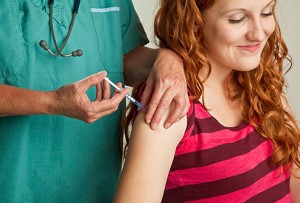 The human papillomavirus (HPV) vaccine has been touted as a way to prevent cervical cancer and genital warts, but a new study suggests the vaccine may also prevent women diagnosed with precancers from developing recurrences.
The human papillomavirus (HPV) vaccine has been touted as a way to prevent cervical cancer and genital warts, but a new study suggests the vaccine may also prevent women diagnosed with precancers from developing recurrences.
Researchers randomly assigned more than 1,350 women diagnosed with genital warts or certain precancerous conditions to receive either three injections of the HPV vaccine or a placebo. The women were followed for about four years.
Women who received the vaccine had 46.2 percent lower risk of developing another HPV-related disease after treatment for their genital warts or their precancerous condition.
Typically, women treated for these types of conditions are at risk for subsequent disease later, but the study offers evidence that “vaccination offered substantial benefit” in terms of lowering that risk, wrote the international team of authors, led by Elmar Joura, an associate professor at the University of Vienna in Austria.
Experts not involved with the research told ABC News that the research is significant because it suggests for the first time that the HPV vaccine may offer benefits beyond prevention.




